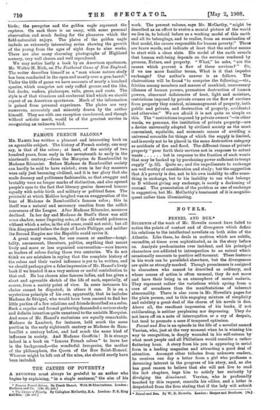THE CAUSES OF POTERTY4
A REVIEWER must always be grateful to an author who begins by explaining, "in a single sentence," the aim of his • Famous Preach 5oons. Br Fntak MaineL With 90 Lhittritions.. London Methuen and Co. [126. 6d. net.] The Causes of Poverty. By Callaghan McCarthy, guniebn. - [24. vet.] - ' •
London: P. B. Sing
work. The present volume, says- Mr. McCarthy, "might be described as-an effort to evolve a mental picture of the world we live in, to behold before us a working model of this earth and all its belongings, and to realise, from an examination of that model, the causes responsible for human poverty." These are brave words, and indicate at least that the author means to start with a clean slate. His model of the earth reveals that human well-being depends on the services rendered- by persons, Nature, and property. "What," he asks, "are the causes which prevent a flow of these services P" Or, if we use more familiar terms, What is it that impedes exchange ? Our author's answer is as follows. The obstructions will be found "to comprise the following,—viz., friction among members and masses of mankind, unnecessary idleness of human powers, premature destruction of human powers, abnormal deficiencies of heat, light and moisture, restrictions imposed by private owners on the flow of services from property they control, mismanagement of property, both public and private, and destruction of property, accidental and otherwise." We are afraid it is not quite so simple as this. The "restrictions imposed by private owners "—in other words, we presume, the institution of private property—are a device universally adopted by civilised society as the most convenient, equitable, and economic means of avoiding a universal scramble for things of which the supply is limited, and is surely not to be placed in the same destructive category as accidents of fire and flood. The different items of private property "pour -forth their services not in response to actual wants but in response to the fraotion of such wants- that may be backed up by purchasing power sufficient to tempt supply" (p. 52). Quite so; and the impediments to exchange are well-worthy of consideration and study; but the suggestion that A's poverty is due, not to his-own inability to. offer some- thing in exchange, but to his inability to use what belongs to 11 without giving any exchange, is surely a darkening of counsel. he presentation of the problem as one of exchange is suggestive, but Mr. McCarthy's treatment of it is,magnilo- quent rather than illuminating.








































 Previous page
Previous page